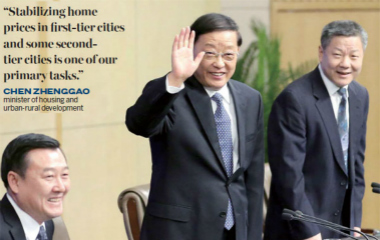China wants stronger financial support for elder care
Updated: 2016-03-21 21:09
(Xinhua)
|
|||||||||
BEIJING -- China will improve financial services related to elderly care as the population rapidly ages, an official document said Monday.
By 2025, a financial system that suits the aging population and meets demands for care should be established. That system should have wide, varied coverage and be efficient and safe, according to a guideline issued by the central bank and four other government agencies.
To realize that goal, China will facilitate the flow of financial resources toward elder care services as long as it is commercially viable, which will not only address demand but also upgrade the financial industry.
Decades of family planning policies drastically reduced China's birth rate and improvements in health care resulted in a greater life expectancy.
China had more than 220 million people aged over 60 in 2015, accounting for 16.1 percent of the total population, official data showed. That number is expected to reach nearly 500 million by 2050, according to UN predictions.
The guideline on Monday listed a slew of measures, including the formation of special financial organizations as well as encouraging banks, security firms and insurance companies to offer financing tools for senior care services.
Banks can provide more preferential credit policies for care providers, allowing them to roll over loans or mortgage land-use rights and real estate.
Qualified senior care firms will be supported to list on the stock market or issue bonds to raise funds. Local governments will be encouraged to establish elder care agencies through public-private partnerships.
Pension funds should be invested through various channels to preserve and increase their value, the guideline said.
Elder care services are far from sufficient in China. There were just 30.3 nursing home beds for per 1,000 people over the age of 60 in 2015, figures from the National Development and Reform Commission showed.
Chinese people will spend over 10 trillion yuan ($1.54 trillion dollars) from 2016 to 2020 on elder care, increasing 17 percent per year,according to a report published by PricewaterhouseCoopers in December 2015.
By 2025, a financial system that suits the aging population and meets demands for care should be established. That system should have wide, varied coverage and be efficient and safe, according to a guideline issued by the central bank and four other government agencies.
To realize that goal, China will facilitate the flow of financial resources toward elder care services as long as it is commercially viable, which will not only address demand but also upgrade the financial industry.
Decades of family planning policies drastically reduced China's birth rate and improvements in health care resulted in a greater life expectancy.
China had more than 220 million people aged over 60 in 2015, accounting for 16.1 percent of the total population, official data showed. That number is expected to reach nearly 500 million by 2050, according to UN predictions.
The guideline on Monday listed a slew of measures, including the formation of special financial organizations as well as encouraging banks, security firms and insurance companies to offer financing tools for senior care services.
Banks can provide more preferential credit policies for care providers, allowing them to roll over loans or mortgage land-use rights and real estate.
Qualified senior care firms will be supported to list on the stock market or issue bonds to raise funds. Local governments will be encouraged to establish elder care agencies through public-private partnerships.
Pension funds should be invested through various channels to preserve and increase their value, the guideline said.
Elder care services are far from sufficient in China. There were just 30.3 nursing home beds for per 1,000 people over the age of 60 in 2015, figures from the National Development and Reform Commission showed.
Chinese people will spend over 10 trillion yuan ($1.54 trillion dollars) from 2016 to 2020 on elder care, increasing 17 percent per year,according to a report published by PricewaterhouseCoopers in December 2015.
Today's Top News
China to roll out new five-year plan for energy sector
Russia retrieves data from recorder of crashed plane
Paris attacks suspect wounded in Brussels shootout
China's latest GDP target is attainable: OECD Chief
What makes the middle class tick
One-stop app
EU to pitch migrant plan to Turkey
DPRK fires medium-range ballistic missile
Hot Topics
Lunar probe , China growth forecasts, Emission rules get tougher, China seen through 'colored lens', International board,
Editor's Picks

|

|

|

|

|

|






